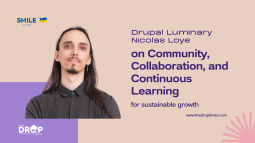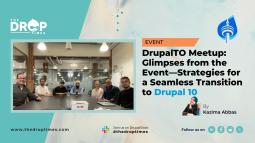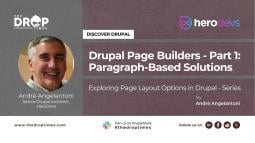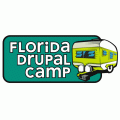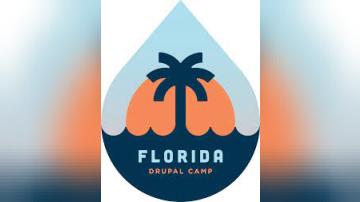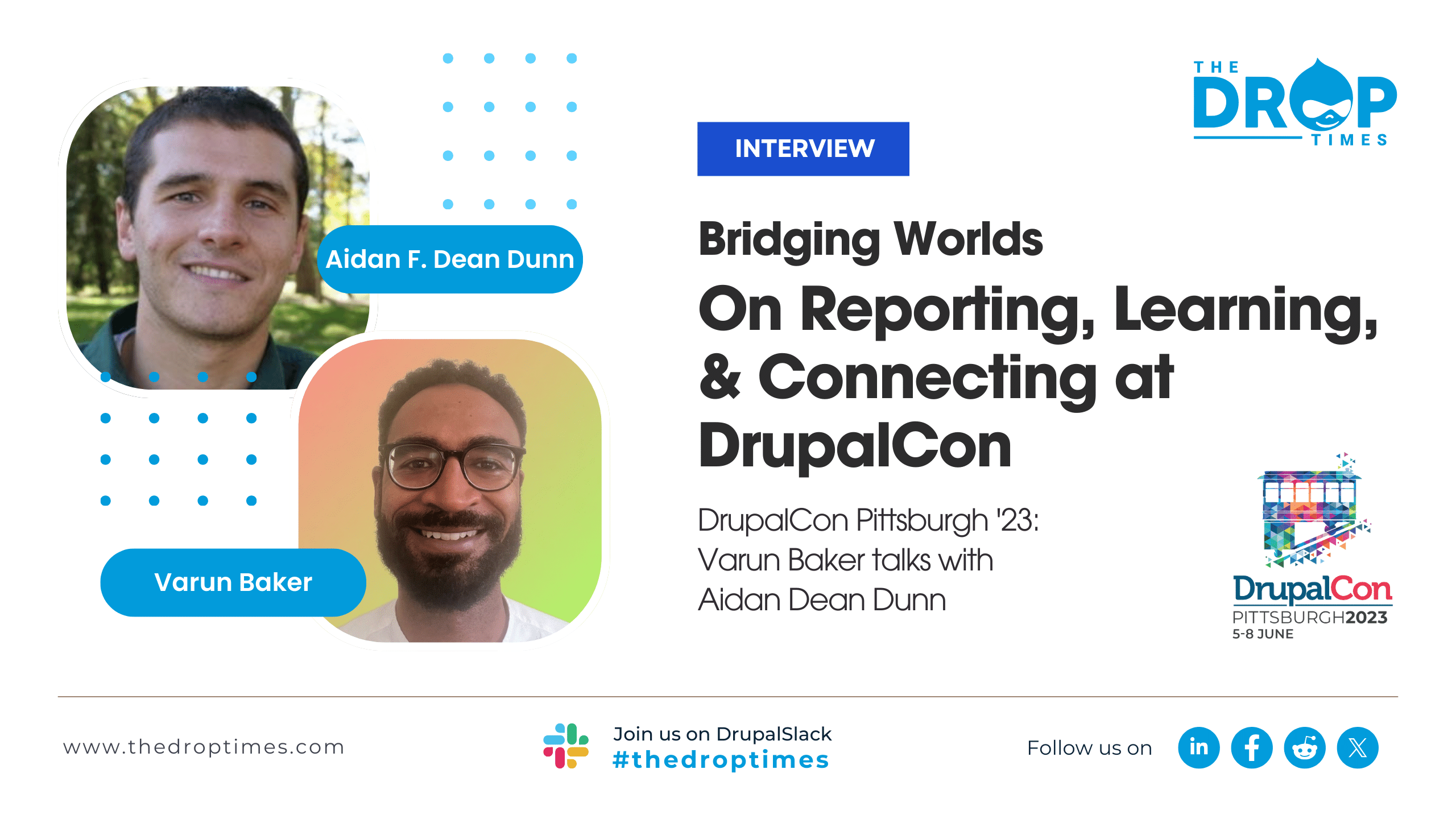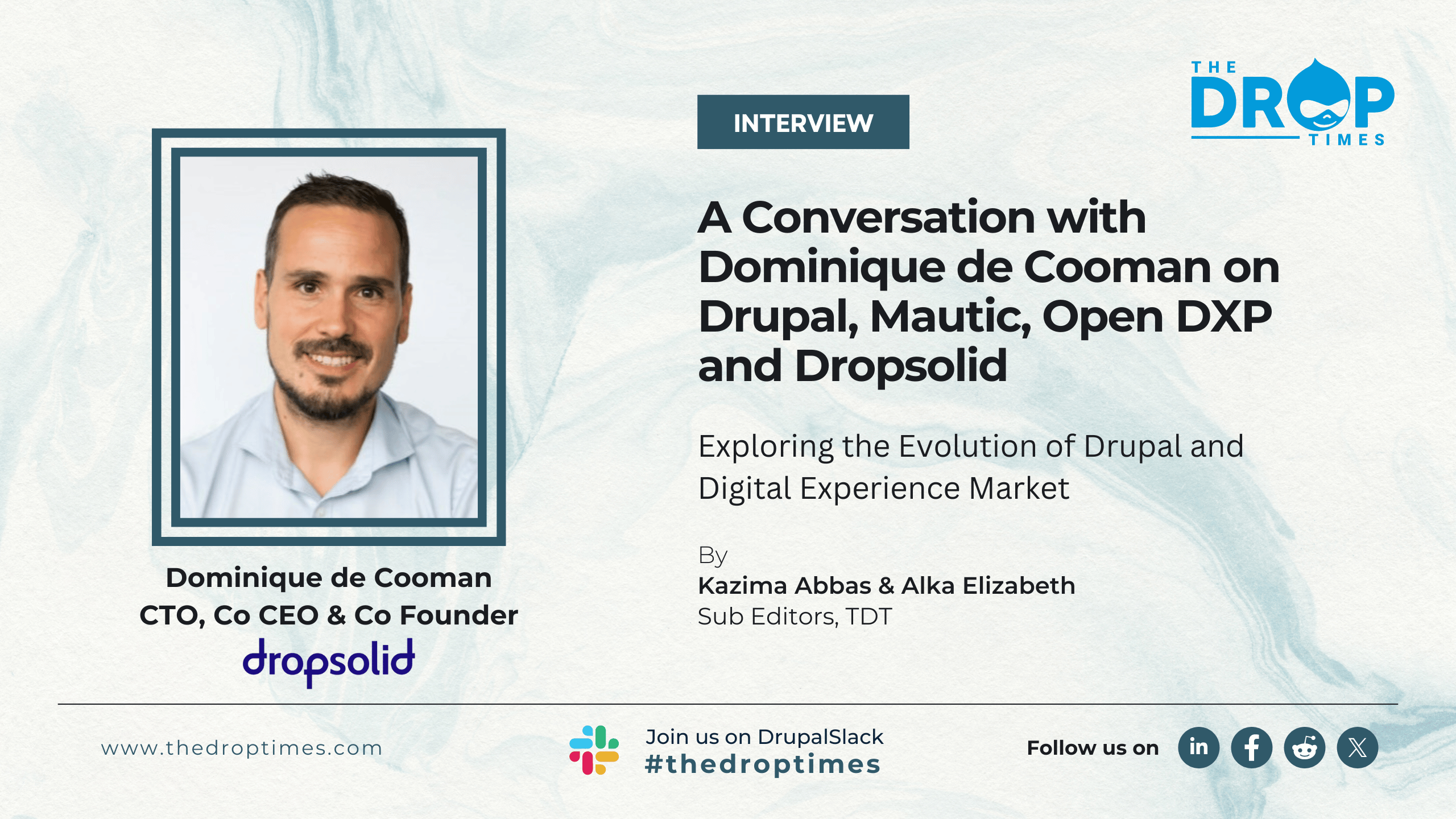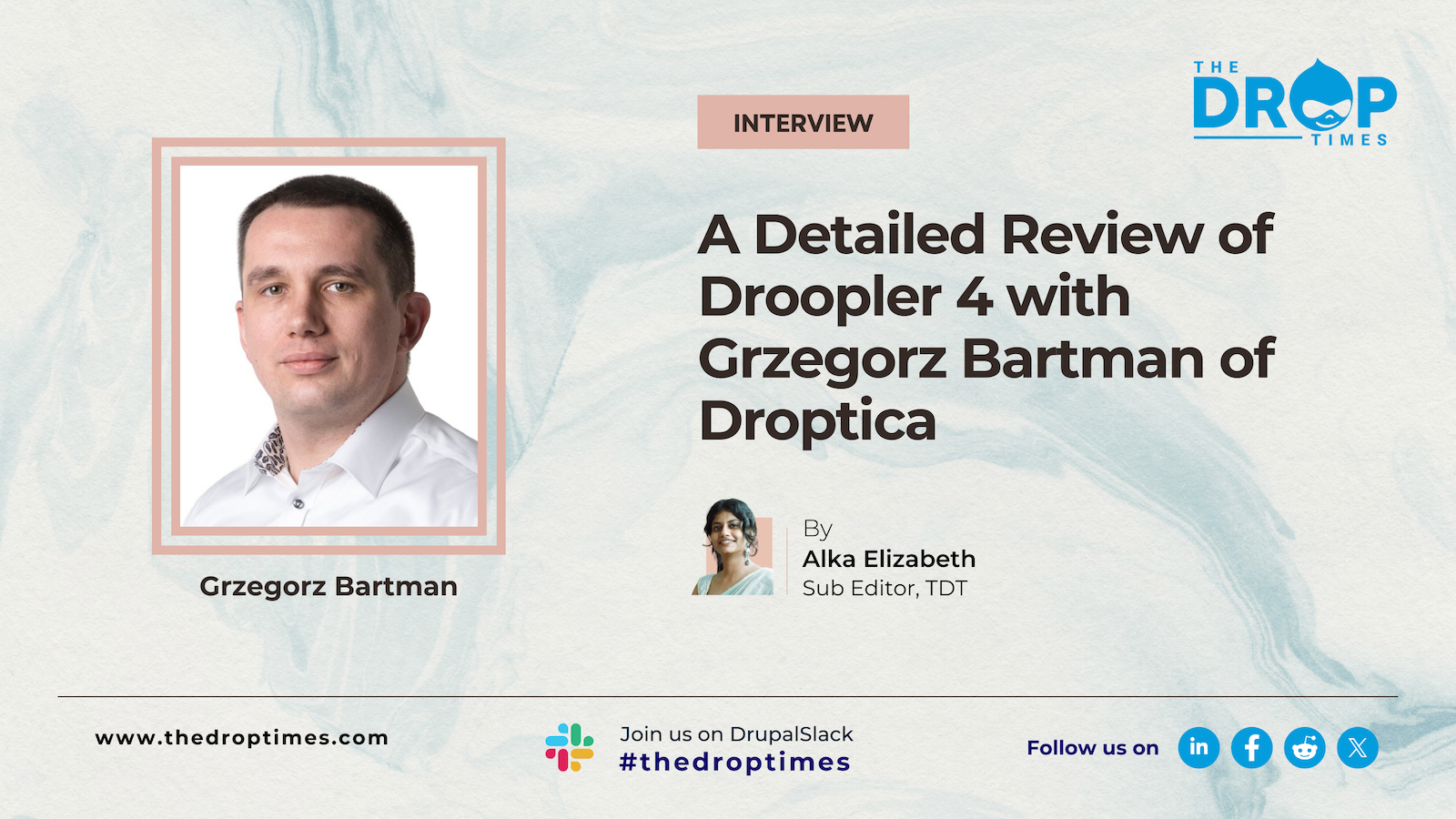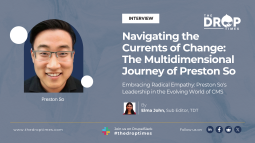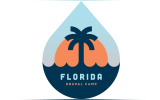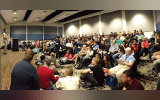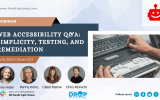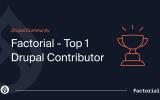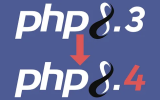Don't Exert Too Much Effort on Headless: Adam Varn | FLDC
"If headless became the focus, it would crush a huge part of what makes Drupal so approachable on a theming level,"
opines Adam Varn, a front-end developer at Lullabot. Adam was speaking to Alethia Rose Braganza, a sub-editor at TheDropTimes (TDT), as part of an interview series with the organizers of Florida DrupalCamp (FLDC). The 12th edition of the Camp is scheduled from 17 to 19 February 2023 at Florida Technical College. This is the second interview in the series.
Adam Varn started with Drupal in 2008, is an active participant in Drupal events and currently takes over as co-lead for FLDC.
From running a solo Drupal shop that he calls a “boutique” to joining as a front-end developer at Lullabot, Adam Varn takes us through his formative years, including his bartering services for access to certain other services and getting trained on the way, in this interview. The talk was carried out through slack and email. Read on to know more:
[TDT 1] What has been your experience working alongside and with the Drupal Community? Can you talk to us about a project you may remember that might have kept you on your toes?
[Adam] I’ve worked within Drupal since 2008, first working for a friend doing front-end design and then for myself from 2010-2021, running my own solo Drupal shop. I’m not a developer in the sense of writing modules/PHP and am more of a site builder and front-end developer, so I struggled every now and then with getting Drupal to do what it needed without writing custom code. I have built small personal and large organization sites, including for city governments, so the usual challenges have to do with data structure, building something that will work and look good, etc.
[TDT 2] Can you take us through a brief timeline of your journey in this industry?
[Adam] My starting history with Drupal was when I was looking for a job doing design work, and a friend of mine needed help turning PSD files into Drupal themes, so I learned Drupal on the fly to get there. Following doing that for a year, I ran Hot Sauce Design & Development in Tampa, Florida. I was a “boutique” shop that I never really advertised and found business from referrals and other people who needed sites. I focused on site-building and front-end work and contracted out to other developers if I required custom code. I was moderately successful in this in that I was rarely not busy and made enough to support myself and later my wife and children through the projects I took on. Then in 2021, I applied for a position as a front-end developer at Lullabot and was ecstatic to be hired.
[TDT 3] What does it mean to you to be a front-end Developer at Lullabot?
[Adam] When I started trying to learn Drupal, the friend I worked for loaned me some Lullabot training DVDs to help me get a better understanding of how Drupal worked. Since then, I’ve always admired the company of Lullabot and the work and contributions they have provided to the Drupal community. Prior to being hired, I also got to know various “Bots” like Mike Herchel and Helena McCabe through Florida DrupalCamp and found them to be great, amazing people.
When I was actually hired on to work for Lullabot, it was, in some ways, taking a chance because it was leaving working for myself behind and working for someone else. At the same time, it was a tremendous opportunity to grow my skills with some of the best people in Drupal. I took the chance and am incredibly happy that I did. I feel like a bigger part of the Drupal community than ever before, and the people I work with are just as amazing—if not more so—than I could have ever expected.
[TDT 4] Florida Drupal Camp has been running for a while. As you also may agree, its success over the years has exceeded one’s expectations. But let’s start from the beginning. Could you tell us about the genesis of Florida DrupalCamp?
[Adam] I’ve attended all but two Florida DrupalCamps—the first one in 2008 and the one in 2017 due to my daughter being born shortly before - and it has indeed gone on longer and been bigger than anyone expected. The first location was at the offices of an Orlando web development shop named MindComet, with roughly 25-30 attendees. The following year it took place at Florida Technical College (it’s current home) for a few years before a brief stint at Rollins College in Orlando for three years. Since roughly 2014, I believe it has been at Florida Technical College. At its peak in terms of attendance, we had about 300 people every year at the Camp. Currently, we average between 100-150.
Mike Anello ran and organized the Camp for 11 years or so, and Mike Herchel, myself, and AmyJune Hineline stepped in in 2021 to take things over. We were actually the last main in-person Drupal event before the pandemic in the world, as far as we know. During the pandemic, we moved the Camp to be virtual and then resumed in person in 2022. Except for, I believe, one Camp somewhere else, we are the longest continually running Drupal Camp in the world, and we continue—year after year—to attract some of the best speakers, presenters, and attendees from Drupal and Drupal adjacent technologies, which is something we are very proud of!
[TDT 5] Burnout is commonly experienced with the use of technology, whether it be for entertainment or work itself. Connecting to the previous questions, would you be able to elaborate on managing both, being a front-end developer as well as looking into your tasks at the upcoming Florida Drupal Camp?
[Adam] We are very fortunate because we have a team of about 6-9 volunteers who step up every year to help get the Camp off the ground and running. Each person coordinates various things, like ordering shirts, handling catering, or sending newsletters. It all comes together, in the end, to create a good experience (we think!) for everyone. Distributing the workload across multiple people, who can help get things done on their own schedule with work and personal life, helps prevent burnout. And if someone does have to step back, someone else is always willing to step in and help out, and it all comes together in the end!
[TDT 6] In your Lullabot profile, you have written about building your first website in 1990, “Adam’s Game Reviews,” for a local ISP Portal, and you recall being paid in kind for free access to video games. This kind of barter system still exists, and most self-taught developers go through this phase. Do you consider it unfair or a great learning opportunity? Also, what would be your direct advice in 2023 to those interested in kick-starting their career in Tech?
[Adam] Back then (1996), I was really just a kid who was into computers, so it worked out well to get something in exchange for learning, and the web was so new and open that it worked out well for me at the time. Today, I am not sure how well the system would really work that is equitable and fair to everyone. There is a strong drive to keep costs down, and for larger companies, that often leads to hiring offshore or to hire “cheap” labor like interns or those in college, which I think creates a system where advancement is very hard. I think that there might still exist in some countries a system where services are bartered—such as building a site in exchange for hosting or graphic work in exchange for some 1-on-1 tutoring—but because of the much more professional, corporate nature of the web today, exchanges like that today—in my experience—are pretty rare.
As for someone wanting to start out, I think that the web itself can really empower someone to get the skills they need. There are tons and tons of free articles, videos, and training out there on every aspect of web development and technology that can be accessed by anyone with an internet connection that can help someone get the skills they need. But like any other skill, it just takes practice, practice, practice to get good at something, so I would say if you find something you really enjoy doing to just keep building and learning it till you can turn it into something marketable as a skill, or at the very least scratch that “itch” that you might have to learn and grow.
[TDT 7] Getting back to the FLDC, with the Camp on its way, what does preparation for a lead organizer entail? What roles are you overlooking?
[Adam] Mostly, it’s just following up on all the little details, checking in with people handling various tasks, and seeing where you can help if needed. On the actual day(s) of the Camp, there is some physical prep and setup, but again, because of our great volunteers and our amazing venue in Florida Technical College, a lot of it comes together all at once. In three years of organizing, I haven’t lost sleep over having everything ready and done for the Camp because I KNOW we will get it done :)
[TDT 7] How would you encourage the Drupal Community members to equip themselves before the Camp’s commencement?
[Adam] The Camp is open to people of all levels and skills, so really, just bring your laptop or iPad to take notes and follow along, read up on the sessions and speakers you are interested in on the website, and just be prepared for a lot of learning, fun, and friendship from one of the best tech communities in the world!
[TDT 8] What are your thoughts on the future of Drupal theming in the context of the growing popularity of Headless/Decoupled CMS? Can you discuss any core changes or plan for changes in the Drupal front-end layer to support this architecture?
[Adam] To me, the theming layer of Drupal had always come second to the data layer and the parts that underlay what Drupal itself is. However, it feels like, since Drupal 9, there has been a much more concerted effort to provide themers with tools to build better themes. The success of Olivero and Claro as modern, accessible themes shows that Drupal still has plenty to offer a themer interested in Drupal, and with the new Starterkit project coming to stabilization in Drupal 10, there will be even more tools. So I’m very glad that the Drupal community has put a lot of effort into improving the theming experience, and I think that it will continue to improve.
My FLDC colleague Mike Herchel is probably the best person to talk about that, given his active development in Olivero and his spot on the DA board, so he might provide answers as to “what is next”.
As far as headless Drupal goes, I have yet to really attempt any project with it, personally or professionally, but I can see the appeal from a backend, data abstraction standpoint. I think it’s great that Drupal can even BE “headless,” as that shows the strong developmental efforts by the community to make it like that. However, I don’t personally think that we should alter Drupal Core in too many ways to cater to this approach because
- the demand for it currently doesn’t seem THAT great and
- if headless became the focus, it would crush a huge part of what makes Drupal so approachable on a theming level by deemphasizing a lot of the work that has already been done. Basically, if it only takes minor work to make Drupal headless in a way that doesn’t divert community resources, I’m all for it, but I don’t think we need to exert too much effort on that.
Related Event Sessions
Disclaimer: The information provided about the interviewee has been gathered from publicly available resources. The responsibility for the responses shared in the interview solely rests with the featured individual.
Note: The vision of this web portal is to help promote news and stories around the Drupal community and promote and celebrate the people and organizations in the community. We strive to create and distribute our content based on these content policy. If you see any omission/variation on this please let us know in the comments below and we will try to address the issue as best we can.




